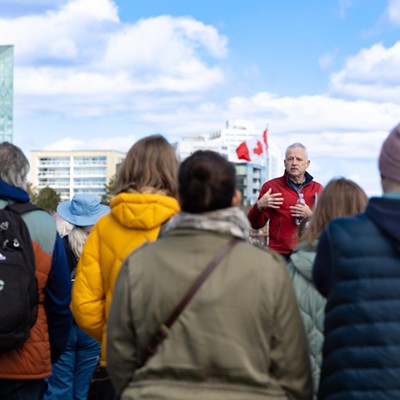There are things we know about Rodney MacDonald, the man who will be our next premier. He is 34 years old, the second youngest man in Nova Scotia history to hold that office. When he is sworn in next week, he will be the youngest premier in the country.
We also know he is a graduate of St. F.X., that he is married with a child, and that, before he became a politician, he was a gym teacher and professional fiddler. But there are many things we don’t still know about the fresh-faced young man who stood on the stage at the Halifax Metro Centre last Saturday and declared: “What a great day to be a Tory in Nova Scotia!” For starters, who put him there? And to whom does he owe what for his new job?
Who paid for our new premier?
The short answer is we don’t know.
The longer answer is… well, longer.
“I don’t want to tell you that I’m denying your request,” Alice McCarron is explaining carefully into the phone. She pauses, tries to find the best way to say what she has to say, fails, says it anyway: “But, actually, I am denying your request.”
I’d emailed McCarron and the fundraising chairs of the other two provincial Tory leadership campaigns in mid-January, asking for copies of interim reports they’d already filed with the party’s convention committee. Each leadership candidate was allowed to raise up to $250,000 in cash and services for his bid, but each also had to submit interim reports (with a final report March 31) detailing not only what each campaign spent but also the names of everyone who contributed, and how much they gave. Under the convention rules, these disclosure statements “shall be available for examination at the offices of the party at times to be prescribed by the Committee.”
“At times,” as Geoff Machum, the chair of the Committee, had already told me, does not mean now—and not any time soon either. If I want to find out who gave what to whom, he’d explained, I’d “have to await the completion and submission by each candidate of their final audited reports.”
Which is to say it could be a very long time—perhaps after our new premier is sworn in, convenes a quickie, here-I-am session of the legislature, dissolves the House, calls an election, maybe even gets himself re-elected with a four-year majority mandate—before we find out who paid for his winning leadership campaign. And, perhaps more importantly, before we begin to figure out what our new premier might owe those who helped him get the job.
Which is why I’d written to McCarron, Neil LeBlanc’s fundraising chair, along with Peter Lynch, the chair of Bill Black’s fundraising committee, and Brian MacLeod, Rodney MacDonald’s chief cash-catcher. “There does not appear to be any impediment to any campaign releasing this information before the convention,” I noted as deferentially as I could muster, then added in my most unctuously ingratiating manner, “…in the interest of full disclosure and transparency, as well as to foster public confidence in the process.”
My message to Lynch quickly got bumped over to Bill Black spokesperson Mike Patrick for what even he conceded was a “non-reply” reply: “We will leave it to the party as to when they choose to release the information.” McCarron telephoned in her non-denial denial. Rodney MacDonald’s fundraising chair didn’t reply at all, but his PR guy, Stephen MacIntosh, eventually did: “We will abide by the rules that have been set out by the Leadership Selection Committee.”
Interim disclosure statements… financial compliance … available for examination… leave it to the party… abide by the rules… Does any of it really matter?
The short answer is yes.
The longer answer is Nova Scotia’s political history.
That long answer, in fact, is much longer than we have space for here. But perhaps a small tiptoe through the tulips of our province’s history of political party fundraising will give you an idea of why knowing who gave what to whom, and why, really does matter.
During the first half of the last century, the Nova Scotia Liberal party perfected a lucrative if illegal fundraising scheme known as toll-gating. Companies wanting to do business with the government—from having their particular brand of booze stocked on liquor store shelves, to offering legal advice to crown corporations, to supplying the hamburger for the hash in local hospital cafeterias—knew they had to fork over a portion of the value of whatever they sold to their friendly Liberal fundraiser.
According to evidence presented at the 1981 influence-peddling trial of three prominent Liberal fundraisers, that party raised at least $4 million—and probably much more—from these illicit tolls alone during Gerald Regan’s eight years as premier (1970-78).
The Mounties did try to find out if the Tories employed similar fundraising practices when they were in power but were stymied because the party destroyed most of its files from those years and—according to testimony during the Liberals’ trial—at least one key Tory fundraiser burned his records.
But wait. That barely begins to skim the surface of the slime. Making decisions largely on the basis of who donated how much is—more often than not—an expensive way to do business.
According to a still-secret report prepared for the province in the 1980s, for example, a local developer contributed at least $60,000 to the Liberals’ 1974 election war chest to convince the cabinet to pay more than top dollar for some otherwise impossible-to-peddle real estate he owned. They did.
The Tories? Lest we forget… In his tell-almost-all 1993 book, Bagman, former Tory fundraiser Donald Ripley fills page after page with various and sundry shenanigans, including the details of how John Buchanan’s Tories raised cash during their years in office.
He recalled one incident involving prominent Halifax developer Ralph Medjuck. Medjuck, Ripley says, showed up at his office with a cheque for $40,000 to help deal with a “small financial crisis” at party headquarters. The original cheque wasn’t made out to the party, but to Ripley himself, meaning it wouldn’t be recorded on the party’s books.
Medjuck, who was a friend of Regan and a former law partner of Buchanan’s and contributed to both parties, did rather well by the provincial government, no matter which party was “in.” During Buchanan’s last two years in office, for example, Medjuck’s companies earned close to $14-million just for renting out office space to the government.
During the mid-1980s, another company owned by a group of well-connected Tories—including Ian Thompson, the province’s recently appointed “ambassador” to Ottawa—landed a lucrative, risk-free deal to build the Nova Scotia Liquor Commission’s new warehouse and head office in the Bayer’s Lake Industrial Park, even though the company wasn’t the low bidder for the job. The Tory-appointed liquor commission went ahead with the deal despite the objections of its own consultants, who pointed out it would cost $1.3 million less for the government to build the building itself—and the province would own the asset too.
Afterwards, a few of the company’s directors—most of whom were Tory contributors—confessed they’d been “leaned on” to make more contributions to a secret party trust fund set up to supplement Buchanan’s premier’s salary. One even said one of those doing the leaning had “hinted” at a connection between the contract and the donation request.
By the way, it may be of interest to note that we’re still paying the price for that liquor commission deal—more than a million dollars every year on a lease that runs until 2011.
Like I said, an expensive way to do business.
But, of course, that’s all ancient history, isn’t it?
During the early nineties, public revulsion over a string of scandals sent Buchanan fleeing the premier’s electric toilet seat—yet another patronage purchase, don’t ask!—for the relative safety of a Senate sinecure.
His successor, a cantankerous Pictou County farmer and political outsider named Donald Cameron, introduced sweeping reforms to put paid to everything from the province’s long and sordid tradition of making political appointments to the judiciary, to our government’s nasty habit of partisan fiddling with constituency boundaries for the electoral benefit of the party in power. In 1991—and more to our point—Cameron also introduced legislation to require every political party to file annual reports disclosing the names of anyone who had donated more than 50 bucks to the political party of their choosing.
Needless to say, he wasn’t premier for long.
Today’s Tories claim to be operating under those same provincial disclosure rules. And they are. The problem is that disclosure only works when it is timely. Elections Nova Scotia, which collects and publishes the donors’ lists, only finally released the 2004 records in late November of 2005.
How useful will it be to discover that our new premier has sold his soul to offshore oil and gas interests, or Big Pharma or buddy-down-the-street only after we’ve handed him a comfortable majority government?
“Voters, whether in a general election or a leadership race, should have the right to know who’s bankrolling the candidates before they vote,” agrees Duff Conacher of Democracy Watch, an Ottawa-based non-profit, non-partisan citizen advocacy organization that lobbies for electoral reform.
But that’s no comfort to Tory delegates who might have appreciated knowing who gave what before they marked their “X” on the weekend. Or—more importantly—to the rest of us who may or may not know who gave how much by the next time we go to the polls.
Ross Haynes isn’t quite sure what I’m fussing about. Haynes is an affable Halifax lawyer, a former regular on CBC-TV’s Thursday night political panel, a past president of his federal Conservative/Alliance constituency association and a defeated candidate for his party’s nomination in the last federal election. His Tory bona fides aren’t in doubt.
But he’s a man of principle too. He publicly resigned from the federal Conservative party in December after Stephen Harper resurrected the same-sex marriage debate at the beginning of the federal campaign. He laughs. “I’ve come a long way for guy who was a self-confessed homophobe” back in the mid-sixties when he was still a young sailor in Halifax.
But Haynes has kept his provincial Progressive Conservative membership card. The provincial party’s long tradition of attempting to be both mildly socially progressive and moderately fiscally conservative suits him. He supported Neil LeBlanc for the party leadership. He may have even written a cheque to help finance his campaign.
My concerns about the lack of openness in leadership campaign fund-raising? “Overblown,” Haynes insists. We’re sitting in his downtown law office near the Grand Parade, enjoying a little left-right, back-and-forth sparring, two political junkies who don’t get the chance to indulge our passions often enough. I’m trying out my fund-raising arguments on Haynes. He isn’t buying.
So why does someone—especially someone in business—give money to a political candidate if not to curry favour, I want to know?
“The people with the real influence on government,” he answers, “aren’t necessarily the big donors. The people with real influence tend to be those who spend their careers working for candidates. Or people who write letters, attend meetings. It’s all about presence,” he says. “If you want influence, don’t write a cheque. Get out there and go door to door with the candidate.”
If that’s the case, I wonder, what exactly do those who donate actually get for their money?
“Part of it is the hope that by contributing to the process you’ll be listened to,” he says. “But you don’t get much influence for that. There are just too many competing interests now.”
We are both old enough to remember the bad old days, the scandals, the secret trust funds, the backroom deals, the rest. We may have some new laws since then, I grant him, but has anything really changed?
“What’s changed,” he says, “is that there’s more public disclosure now. And that’s important. Yes, contributors may have their own agendas but that information is now public. And the media does a better job,” he adds. “We now have a vigilant press that can question motives and hold governments accountable.”
It is my turn to pause. Do we really have a vigilant press in Nova Scotia? I ask finally.
Haynes pauses too, longer than me, longer even than Alice McCarron on the phone.
“It’s so Nova Scotian,” he finally answers with a laugh. “I don’t think particularly good, but I don’t think they’re particularly bad either.” He tries to feel his way around the edges of the quandary. He talks about why it’s important that the Chronicle-Herald is still an independent newspaper, one of the few left in the country. He mention’s Frank’s “muckraking” and The Coast’s “quirkiness… And then there’s the weekly rags… They sometimes cover…” He pauses again. Considers. Longer still.
“Thank god we have the CBC,” he says at last.
We don’t get into the number of journalists who’ve been laid off at the CBC in the last 10 years. Or the number of senior journalists who’ve recently jumped—or been pushed—out the Daily News’s door.
Is our media really vigilant?
The short answer is no.
The long answer is no too.
Consider for a moment the most recent edition of Elections Nova Scotia’s “Annual Statements of Political Contributions,” the hundred-odd page, spiral-bound collection of spreadsheet printouts listing the names and addresses of every individual or business that anted up $50 or more to one of Nova Scotia’s three main parties in 2004.
It probably won’t surprise you to know that the Tories, the only party with the power to hand out contracts and set policy, raised nearly $666,000. That is more than the combined total of both the NDP ($316,000) and the Liberals ($281,000).
For some strange—or not so strange—reason, the governing party almost always rakes in more money than those that don’t control the public purse. In 1997, the last full year of the last Liberal majority government, for example, it was the Liberals who raked in the lion’s share of contributions—$662,000 compared to the PC’s $393,000 and the NDP’s $291,000.
For the same reason, the party in power almost always gets more money from companies and those with an interest in government contracts or government policy than do the Opposition parties. The Tories, in fact, raised nearly one third of their total take from just 84 big donors, each of whom gave more than $1,150 to the party. The list—no surprise—includes a dozen names you would know from the world of banking and finance, at least 10 companies involved in construction and development, half a dozen from offshore oil and gas, four from the pharmaceutical industry and the usual sprinkling of law firms, ad agencies and the like.
How many of these companies, firms and lobbyists were simply, selflessly interested in supporting the democratic process? Well, consider only that Aliant, the Tories’ biggest single donor, gave not a farthing to the Liberals. (The NDP doesn’t accept major corporate donations.).
The big-ticket Tory donors include many whose commercial interests are intimately intertwined with the government. Take Cornwallis Financial Corporation ($4,782.82), for example. In 2002, the province signed an untendered five-year contract with Cornwallis to serve as the government’s exclusive marketing agent for attracting economic immigrants. Under the deal, would-be immigrant entrepreneurs must put up $130,000—$30,000 of which goes to Cornwallis and its overseas agents—just to get a toe in the door.
NDP Immigration critic Kevin Deveaux claims the fees are “the most expensive” charged by any province in the country and calls the program “exploitative and morally bankrupt.” He wants the province to terminate the contract “immediately.” Under pressure, the province did recently hire an outside consultant to review the fees.
But perhaps the most intriguing and under-reported political contribution in 2004 came from Trade Centre Ltd., the operators of the Halifax Metro Centre—where the Tory convention was booked—the World Trade and Convention Centre and assorted other convention and meeting venues. Its $6,691.12 donation was the second largest single donation the Tories received that year.
But isn’t Trade Centre Ltd. a crown corporation, you ask?
It is.
That means the government owns it, right?
Right again.
And appoints most of its board of directors?
You’re on a roll.
And aren’t most of the directors prominent Tories?
Uh huh.
So… what’s a publicly owned and operated enterprise like Trade Centre Ltd. doing contributing money to a political party, let alone being the second-biggest donor to the party whose government controls it?
I thought you’d never ask. Hardly anyone else has.
Not that Fred MacGillivray doesn’t have an answer. MacGillivray, the president and CEO of the Trade Centre, says the money went to purchase tables at two party fund-raising dinners—a PCNS Fund Annual Dinner held in October 2003 and a federal Progressive Conservative leader’s dinner, also in the fall of 2003.
Which explains the what, but not the why.
“We buy tables all the time,” MacGillivray explains. Groups that rent out Trade Centre facilities “are always asking us to cut their bill, or make a donation or whatever. We choose to buy tables. We do it for them all. We do it to be part of our community, to support charities and non profits—”
But political parties aren’t charities or non-profits.
MacGillivray concedes that it’s a “fine line,” but adds that Trade Centre has bought tables at Liberal events too. “We’d do the same for the NDP but they haven’t used our facilities.” (Trade Centre Ltd. does show up in the Liberal donor column three times in the last 10 years, but the total amount Trade Centre donated to the Liberals over those years is barely a third of what it gave to the Conservatives in 2004 alone.)
Does it concern you, I ask, that Trade Centre Ltd. is essentially giving money to a political party whose government controls it? And that some of that money was funneled through an organization called the PCNS Fund, whose chair—Halifax lawyer Stewart McInnes —also happens to be the chair of the board of directors of Trade Centre Ltd.? Which is to say Fred MacGillivray’s boss.
“No question it would be simpler if he wasn’t,” MacGillivray allows, “but we’d do it anyway whether he was the chair or not. It’s just the way it is.”
MacGillivray insists that he’s the one who makes such decisions and that members of the board—whose provincial appointees, besides McInnes, include other prominent Tories like former cabinet minister George Moody, Peter Bryson and Dave Chisholm—never discussed the decision to buy the tables.
So who does get to dine on the Trade Centre’s—our—dime at these functions?
Sometimes, MacGillivray explains, the Centre will offer the tickets to its customers. Sometimes staff get to attend. Occasionally, board members themselves might express an interest in going to the function.
The PCNS dinner? MacGillivray says he can’t remember who sat at the Trade Centre tables. “But I can tell you one thing,” he is quick to add. “I wasn’t there.”
MacGillivray is equally quick to make the point that he understands why I’m interested in the details. “I would be too if I was in your position,” he says.
Have any other reporters asked him to explain the donation, I ask.
“A handful,” he says, “a handful.”
The only story I can find that even mentions the Trade Centre donation is a November 25 story in the Chronicle-Herald by provincial reporter David Jackson that includes the fact of the donation in a laundry listing of the largest party contributors but offers no explanation of how a provincial crown corporation ends up giving public money to the political party whose government controls it.
Leadership campaign contributions? So far as I know, the only mainstream reporter to have asked leadership convention organizers for copies of those candidates’ interim disclosure reports is Murray Brewster, the Canadian Press bureau chief. They told him no too.
A vigilant press?
No.
At one level, it was the most democratic of political conventions. Three very different but well-matched candidates—a successful, up-by-the-bootstraps businessman with a direct manner and a social conscience, a veteran pol who still knew his way around the corridors of power, and a fresh-faced youngster who was still better known for his abilities as a fiddler than for his political prowess—all competing for the support of the party faithful.
At another level, the convention—like the way in which close to half the Metro Centre was blocked off with black curtains to make it seem, for the TV cameras, more crowded than it really was—was an illusionist’s trick.
Even during the campaign, there were hints. During the Bedford delegate selection meeting, for example, organizers for Bill Black and Rodney MacDonald combined forces to deny the then-perceived front-runner, Neil LeBlanc, any delegates at all.
And on the convention floor last Saturday —when third-place finisher LeBlanc and his entourage of cabinet ministers quickly made their way over to anoint MacDonald and deny city slicker-outsider Black the victory within a few minutes after the first ballot—it was clear that the real deals had already been done behind closed doors long before the ballots were counted.
What else happened behind those doors? Who paid for all the polltakers and spinmeisters? For the printing of the campaign posters and buttons, the pallets of bottled water with Rodney MacDonald’s name on it, the delegates’ travel bills, the hospitality suites, the convention parties?
More importantly, what do they want for their investment in the democratic process?
The short answer is we don’t know.
The longer answer is that we won’t find out for a while—perhaps not until it’s too late to matter.














